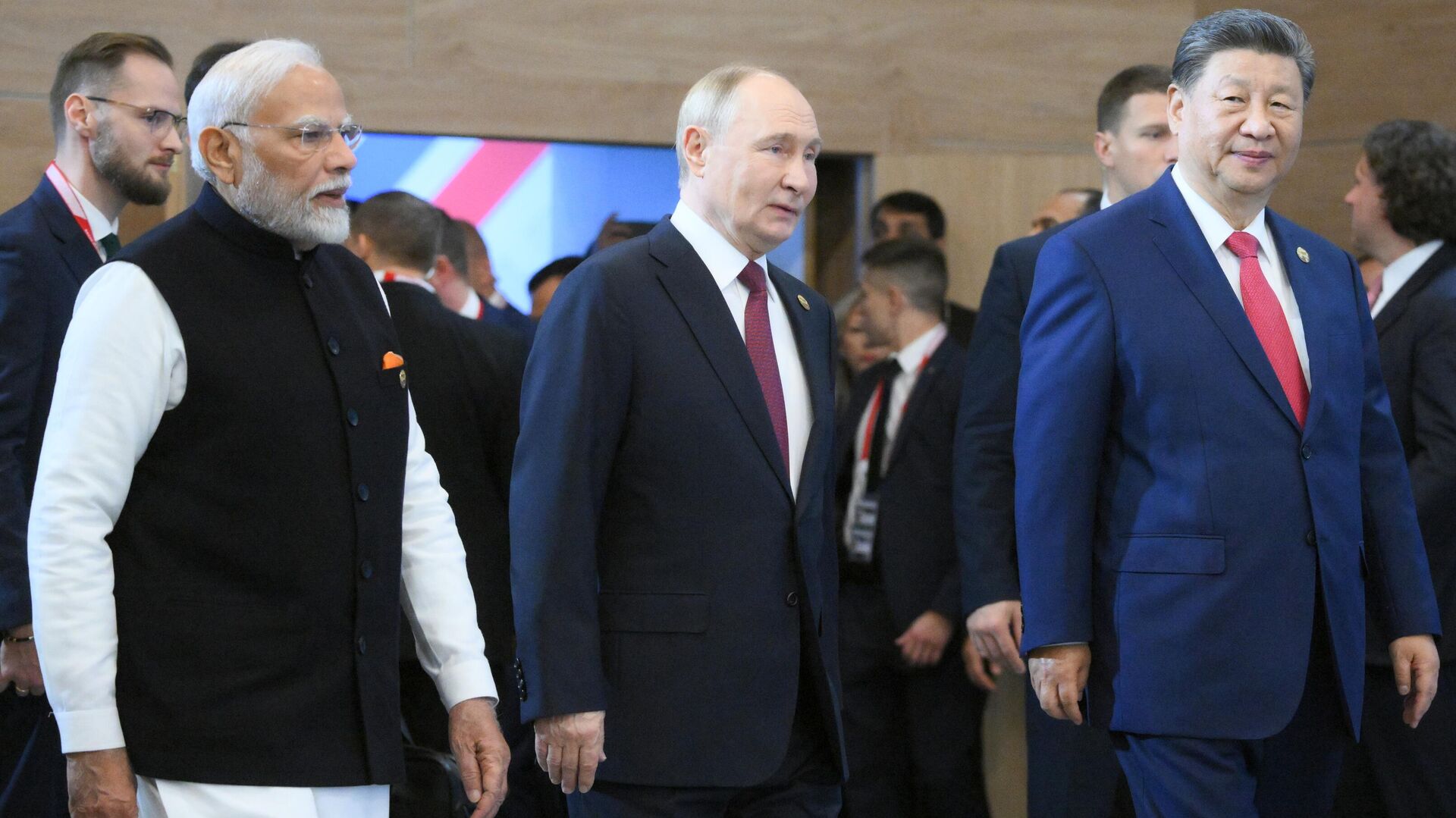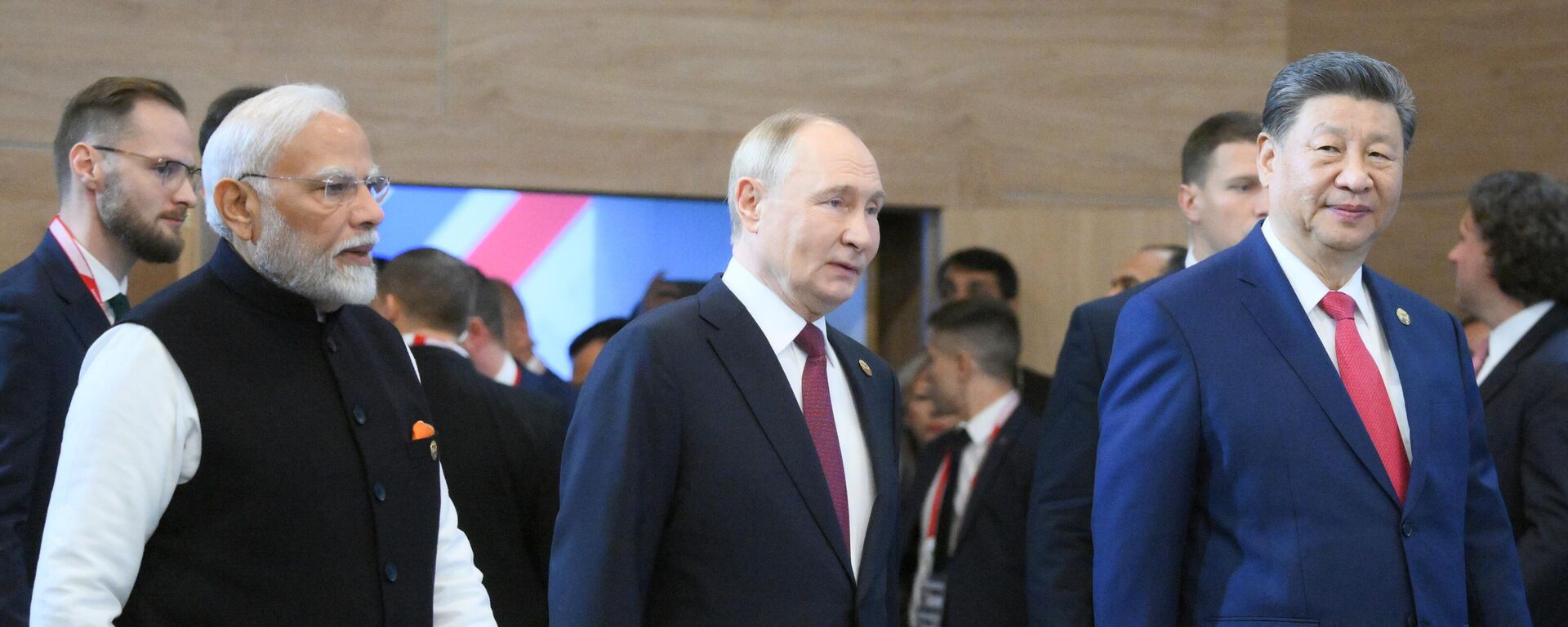US Claims About Nations Abandoning BRICS False: Experts

© Sputnik / Фотохост-агентство brics-russia2024.ru
/ Subscribe
With the BRICS grouping pushing for establishing alternative trade mechanisms in its de-dollarisation efforts, US President Donald Trump has gone out, targeting the bloc's members with severe tariffs.
American claims that nations are deserting BRICS due to intense pressure applied on them through trade tariffs by the current US administration led by President Donald Trump appear to be exaggerated and, in essence, are untrue, experts have said.
Notably, Trump on Tuesday claimed that his threat of tariffs against nations making a move away from the American dollar in trade has paid dividends, and these countries are now abandoning the powerful geo-economic bloc.
"I told anybody who wants to be in BRICS, that's fine, but we're going to put tariffs on your nation. Everybody dropped out. They're all dropping out of BRICS," Trump told reporters at the White House after his meeting with Argentine Prime Minister Javier Milei.
"I'm very strong on the dollar, and anybody that wants to deal in dollars, they have an advantage over people that aren't... BRICS was an attack on the dollar, and I said, You want to play that game, I'm going to put tariffs on all of your products coming into the US. They said, like I said, we're dropping out of BRICS... They don't even talk about it anymore," the American leader elaborated.
But geopolitical analysts debunked Trump's statement, underlining that BRICS was only growing in stature and clout.
There is some exaggeration in President Trump's remarks. No one is abandoning the BRICS grouping. In fact, the Global South countries are looking at BRICS in order to hedge against the unpredictable policies of the current US administration, stated Dr Raj Kumar Sharma, a Senior Research Fellow at the New Delhi-based think tank NatStrat.
"The BRICS grouping is working to trade more in local currencies. In August 2025, the Reserve Bank of India removed prior approval requirements for banks to open Special Vostro Rupee Accounts (SRVAs), speeding up rupee-based trade settlements and supporting the internationalisation of the Indian Rupee (INR). RBI's vostro accounts are held by foreign banks with Indian banks in INR to facilitate bilateral trade settlement in local currencies," he told Sputnik India.
Nations around the world need to take on any kind of financial hegemonic policies head-on and should coordinate with other like-minded countries. BRICS is one such forum in which more such consultations could be seen in the coming months, the strategic affairs commentator stressed.
Dr Sumant Swain, a Eurasia pundit and the Director of the Eurasian Foundation in India's capital, backed Sharma's remarks, emphasising that Trump's claims about nations abandoning BRICS were not true.
Rather, it will strengthen regional economic cooperation and promote bilateral and multilateral trade through local currencies or alternative arrangements. Countries are trying to move away from external threats and maintain strategic autonomy instead of dependency, he added.
"BRICS is becoming more structured and may advance free trade through different mechanisms, including bilateral and multilateral agreements. In the current context of geopolitical and geo-economic crises, BRICS is expected to play a major role in stabilising the global market. Many countries are also aspiring to join BRICS despite external pressures and threats," Swain said in an interview with Sputnik India.
Like other major decisions, this move by the US may backfire, as it could further encourage regional trade through local or alternative currencies. This will not affect the BRICS grouping, as India has always maintained strategic autonomy in trade and economic relations based on the core principles of non-alignment and strategic partnerships, he reckoned.
Countries may avoid external pressures, and this will not negatively impact their bilateral relations or economic cooperation. Instead, it will help strengthen the bond among BRICS nations even further, the think tanker argued.
"America's acknowledgement that BRICS poses a serious threat to its economic hegemony clearly reflects that BRICS aims to establish a multipolar global economy. The trade turnover among BRICS countries has reached a multi-trillion-dollar scale, representing about 3.26 billion people and a combined GDP of $27.4 trillion," Swain highlighted.
Together, they form a huge economic powerhouse, with most member countries recording some of the highest GDP growth rates and making substantial contributions to the global economy. BRICS stands today as a strong pillar of global economic stability and progress, he noted.
BRICS nations are demonstrating that economic sovereignty and cooperation among developing nations are achievable. Their initiatives to promote trade in local currencies, create alternative financial institutions like the New Development Bank, and reduce dependence on the US dollar are significant steps toward a truly multipolar world economy, the observer underscored.
"Nations across the Global South should indeed take inspiration from these examples. By diversifying trade partnerships, strengthening regional alliances, and investing in local industries, they can resist external economic pressures and assert greater control over their economic futures," Swain asserted.
Standing united against unilateral sanctions and tariffs not only safeguards national interests but also promotes a fairer, more balanced international order. Ultimately, BRICS represents not a threat but an opportunity for nations to collaborate, innovate, and redefine the dynamics of global economic power, he concluded.


